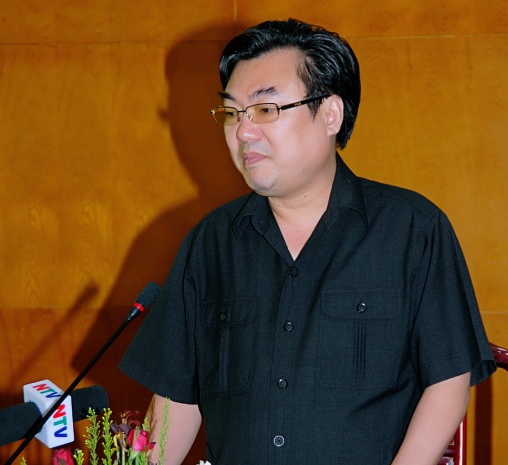| ÔN THI TN THPT 2017 |
|
|
| TRANG WEB LIÊN KẾT |
|
|
| ÔN TẬP HỌC KỲ 1 |
|
|
| ĐĂNG NHẬP |
|
|
| RÈN LUYỆN KỸ NĂNG |
| MỖI NGÀY NÊN HỌC |
| WEBSITE NỔI BẬT |
| CẢNH ĐẸP VIỆT NAM |
|
|
| THỐNG KÊ TRUY CẬP |
|
Thành viên |
Main » 2013 Tháng 6 24 » Ignoring criticism, Nam Dinh says “no” to in-service training graduates
|
12:24 PM Ignoring criticism, Nam Dinh says “no” to in-service training graduates | |
 VietNamNet Bridge – In a notice about the 2013 civil servant recruitment plan, the Nam Dinh provincial people’s committee stated that it would not accept the candidates who finish in-service training courses. Nguyen Xuan Binh, Chief Secretariat of the Ministry of Interior Affairs. The notice has once again faced the strong opposition from the public, which believes that the provincial authorities have violated the current laws when refusing the graduates of in-service training, a kind of legal training recognized by the laws. Nguyen Xuan Binh, Chief Secretariat of the Ministry of Interior Affairs, in an interview given to Giao duc Vietnam newspaper, affirmed that the Civil Servant Law does not comprise of any regulation saying that state management agencies are prohibited to recruit the candidates who finish in-service training. The Education Law does not mention the discriminatory treatment to different training modes. "All the state agencies and state agencies’ officers have the responsibility of restricting the laws,” Binh said in the interview. Meanwhile, Nguyen Van Tuan, Chair of Nam Dinh province, keeps calm amid the heavy criticism. He said that saying "no” to in-service training graduates has been laid down as a provincial committee of the Communist Party. Nam Dinh remains the only province in Vietnam which refuses to recruit the graduates of in-service training courses for its state agencies. Tuan has cited two reasons behind the decision on refusing to recruit in-service training graduates: 1) the in-service training quality is too low, and 2) Nam Dinh province has too many excellent students and no need to consider recruiting worse students who finish in-service training mode. Tuan said in the war time, when not many people had the opportunities to follow university education, in-service training was really helpful, allowing officers to improve their qualifications and obtain university degrees. That explains why many current high ranking leaders in the province finish in-service training courses. However, the conditions now are quite different, and it’s now the time to recruit the officers who are well trained under full-time training courses. Most of the in-service students are believed to have bad learning abilities, who only attend in-service training courses because they fail the university entrance exams to the full-time training courses of state owned schools. "I once worked with in-service training graduates and I found them unqualified enough,” he said. The second reason, according to Tuan, is that Nam Dinh has been well known for its people’s eagerness for learning, and Nam Dinh’s students are too good at their study. Therefore, the provincial authorities find it unnecessary to recruit worse candidates. "Nam Dinh has always been listed among the top provinces and cities which have the best students’ achievements at the national university entrance exams every year,” Tuan said. Nam Dinh’s students have always been leading at the national competitions for excellent students. At least 10,000 out of the 20,000 students pass the university entrance exams every year. "In-service students cannot be compared with full-time training students,” he maintained. Especially, Tuan believes that the policy on saying "no” to in-service training students would help students make more reasonable choices for their education. To date, nearly all the high school graduates plan to attend the university entrance exams to fulfill their "university education dream.” Those, who fail the exams to state owned schools, would attend in-service training courses to obtain university degrees at any costs. However, the students may change their thoughts if they realize that they would have no opportunities to become the officers at the local state agencies. GDVN
| |
|
| |
| Total comments: 0 | |















